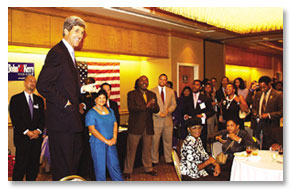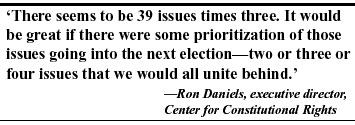
WASHINGTON (FinalCall.com) – There is good news and there is bad news to report from the 33rd Annual Legislative Conference held here by the Congressional Black Caucus (CBC) Sept. 24-27.
At least half of this year’s theme–Collective Leadership Challenging a Bold New World–is accurate. We are living in a bold new world.
But on the eve of yet another presidential election cycle, the CBC’s leadership is anything but collective, and a number of Black political figures contacted by The Final Call at the CBC conference are troubled by the lack of solidarity in the Black leadership ranks.
-News Analysis-
“I think it is somewhat ironic that you and I (are) here at the Congressional Black Caucus meeting which has a theme of collective leadership, but where the members of the Caucus have all endorsed individuals un-collectively, among the 10 Democratic presidential candidates,” complained Dr. Ronald Walters, Political Science Professor at the University of Maryland. “That doesn’t make any sense to me. That’s not collective leadership.”

Ron Daniels, Executive Director of the Center for Constitutional Rights agrees. “There’s two ways of looking at it,” said Mr. Daniels. “Folks would obviously be in a position where they would spread their bets in a way to make sure there’s influence in all the camps.
“I prefer a strategy where by and large, you determine a candidate–preferably a Black candidate, using Ron Walters’s Leverage Thesis proposition–and then use that at the convention to extract benefits. If you’re all scattered all over the place, it minimizes, and really dilutes your power. I think it’s problematic.”
Historically, the Black vote has always been cast collectively in presidential elections, and for the last 40 years, primarily for a nominee of the Democratic Party. In the elections of 1960, 1976, 1992 and 1996, that solid Black vote has made the difference in victories for Presidents John F. Kennedy, Jimmy Carter and Bill Clinton.
In 1984 and 1988, Black voters were energized by the presidential campaigns of Rev. Jesse Jackson. Despite the ultimate victories those years of Republicans Ronald Reagan and George H. W. Bush, the Jackson campaigns gave Black political activists a sense of empowerment at the Democratic conventions.
Black delegates attended those conventions with some semblance of unity and bargaining power behind Rev. Jackson, the Black national “Favorite Son.”
This year, Mr. Daniels pointed out, there is a lot of information disseminated at the CBC conference, but it is diffused and unfocused. “There seems to be 39 issues times three. It would be great if there were some prioritization of those issues going into the next election–two or three or four issues that we would all unite behind,” he said.
“I would hope that, at some point, the CBC Foundation would be able to do some tracking, and be able to lay out an agenda, and then follow through on that agenda, so when you come back from year to year with your Brain Trust you see the motion and the movement.”
CBC member Albert Wynn (D-Md.) defends the current Caucus approach. “My sense is that we are actually moving in the right direction, because we have people who are focusing on a variety of issues,” he said in an interview.
“There are three or four CBC members that are focusing on minority business development; three or four focusing on health issues; three or four focusing on education issues. So, no single member is trying to be all things to all people, but yet we’re developing a core of people with expertise in each of these issues.
“And we will affect policy. On health care, the crisis in reimbursing doctors is a big issue. We will affect policy on bank lending and getting access to capital. We’ll affect policy in terms of minority businesses getting access to federal contracts and private sector contracts. So, there’s a lot of information, but there’s also a lot of policy being developed, as well as relationships.”
Mr. Wynn also scolds those Black political activists who complain about a feeling of “impotence” among Black leadership.
“There is a tendency, in my opinion, to focus on victimization. That creates a mindset that the world is against us. The system is against us. White Americans are against us. Bush is against us. We need to change that and start focusing on the things we need to do.
“For example, we talked about savings. There’s too much jewelry being bought, flashy cars, flashy clothes, and not enough saving for college going on. As that idea takes hold, we can change the situation in our communities. We talked about getting people to go to the doctor more regularly. A lot of people are focusing on that: how to improve African American health.
“So things are happening and we have to focus on how we can take the bull by the horns and be proactive.”
One way Blacks can be proactive in the upcoming political cycle is to hammer out a workable agenda, according to Massachusetts State Sen. Bill Owens (D).
“One of the things that we’re trying to do right now is to establish an agenda conference in Boston in March of 2004, to give people an opportunity, not to have a hundred agendas, but to have a few agendas that are narrow, and then begin to prioritize whatever those agendas are,” Sen. Owens said.
“I think that once we gain a victory, we can have other victories, but we need to know where we want to place our interest and our energy, so that we can in fact have victories.”
Sen. Owens also argues that Blacks should have continued demonstrating and protesting in the streets, even as more and more Blacks were elected to public offices.
In 2004, the Black vote can be powerful, in important state contests in battleground states, and especially in the South, Dr. Walters predicts. “So, we’re now mounting something for the ‘Unity 2004 Campaign’ and the National Coalition of Black Civic Participation, calling all of the non-partisan organizations to come on board, to be a part of that campaign.
“We’re adopting a ‘War Room’ where we’re going to be in at least 15 of the major cities in the country, and we’re going to be dealing with non-partisan voter registration and turn-out drives starting now. His group is also going to be part of the 40th Anniversary March on Washington’s “Rolling Mobilization,” and they are joining forces with the Youth Voter Mobilization organized by hip hop music entrepreneur Russell Simmons and the Hip Hop Nation.
The fact that her former colleagues have not endorsed her candidacy does not upset at least one of this year’s two Black presidential candidates. “No, I think people obviously have to support who they want to support,” former Senator and CBC member Carol Moseley- Braun told The Final Call. “I have no problem with it. I feel confident that we’re going to have the support in the election from the communities they represent.”
She said that she is not troubled by the fact that CBC members have not adopted the “Favorite Son” or “Favorite Daughter” tactic often used by Illinois Sen. Everett Dirksen (D) to keep that state’s delegation un-committed going into the party’s conventions by endorsing her or Rev. Al Sharpton, the other Black presidential candidate.
“I don’t know,” she said when reminded of the Illinois senator. “I just know that my campaign is moving forward and I’m very excited about the prospect of winning one of these primaries.”
Reps. Juanita Millender- McDonald (D-Calif.), Harold Ford Jr. (D-Tenn.), and Gregory Meeks (D-N.Y.) were listed as “supporters” of the presidential campaign of Sen. John Kerry (D-Mass.), hosting a CBC conference reception for Mr. Kerry.
Reps. Bennie Thompson (D-Miss.), Major Owens (D-N.Y.), and Bobby Scott (D-Va.) were all listed as co-hosts for a reception sponsored by the Dean For America campaign committee of former Vermont Governor Howard Dean. But Laurence Dillard, press spokesman for Rep. Scott told The Final Call that Mr. Scott has offered to help a number of presidential candidates, but he “absolutely” has not endorsed anyone.
Another Black political activist defended his open support for Dr. Dean, a physician. “As a person who risked his life for the right to vote in Mississippi, I was the chairman of the Mississippi Freedom Democratic Party. I took Fannie Lou Hamer to register to vote. I will wage my credentials against anybody in America of solidifying and empowering the Black community throughout the country,” Washington, D.C. activist Lawrence Guyot said in an interview.
“But I say very clearly and without reservation–and I supported Jesse Jackson when he ran for President. I raised $77,000 for him in one weekend because he had that kind of support. Now the support I see, and where I’m going, is to the Dean campaign.
“I want to elect Dean because I believe that people like me will have an impact on who he puts in his Cabinet and who heads his agencies. We don’t have the time for exotic luxuries. With us, this is pragmatic building, because it’s about our survival in a country that no longer needs us.”
“But wouldn’t we have a stronger position if we withheld our support to broker it at the Democratic Convention?” Mr. Guyot was asked.
“Right now there are 13 states, that if there’s a Black and Brown coalition, those 13 states could comprise 70 percent of the electoral vote needed. We should be about the job of registering people to vote and operating in our own interest. I see Dean as the answer to that question. We don’t have any problem that we can’t vote ourselves out of,” he responded.
Ironically, one of the untold stories this political season is the almost non-existent gap between the rate of Blacks and Whites voting in the U.S. elections, said Dr. Walters. “The gap in voting between Blacks and Whites had closed to two percent. In effect, what we can say is that the Black community, in terms of the proportion of the people who are voting, is now equal to the proportion of Whites in that community who are voting. We have virtually eliminated the gap between the two.
“That’s a hell-of-a-story, and nobody’s talking about that. I would hasten to say that the turnout is not enough. I’m not saying that because this has happened, that’s enough. We are now poised at the point where the Black vote is now equal to the percentage of Blacks in the population–13 percent of Blacks in the population, 13 percent of the electorate. Now that’s a powerful performance since 1965 and the passage of the Voting Rights Act.”












